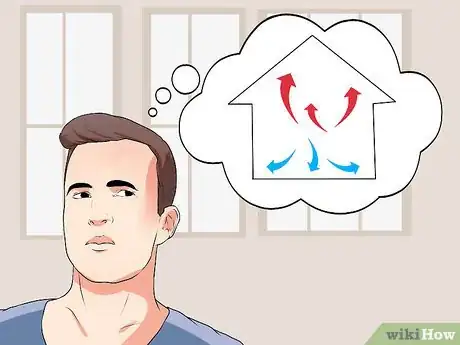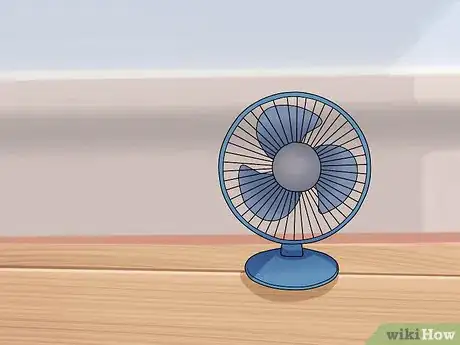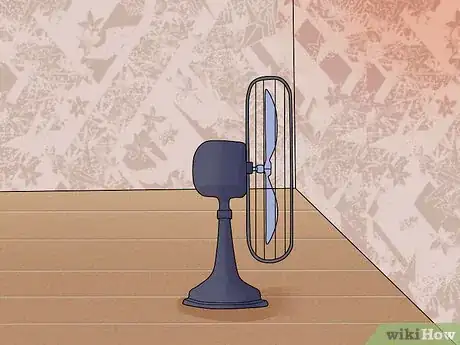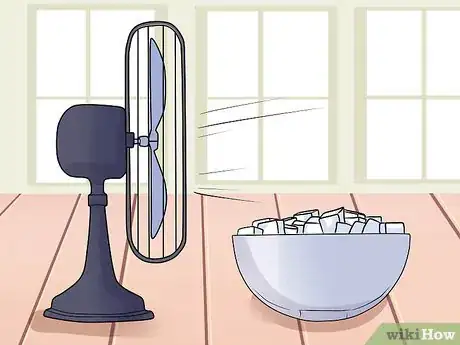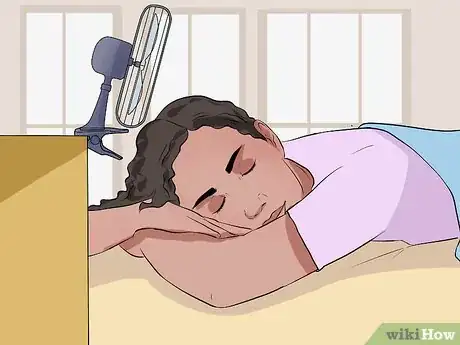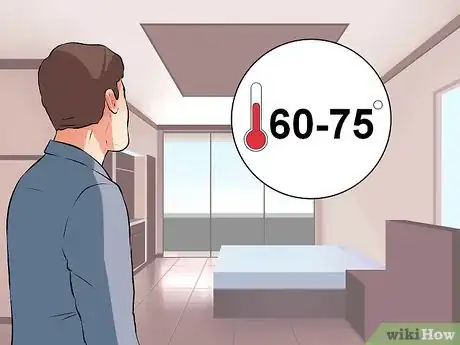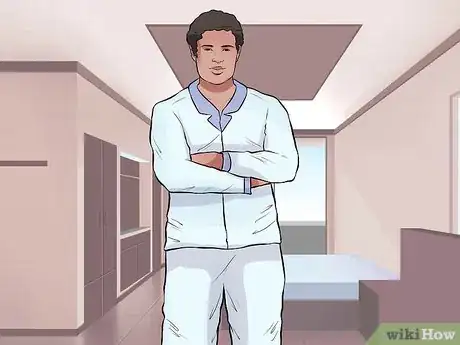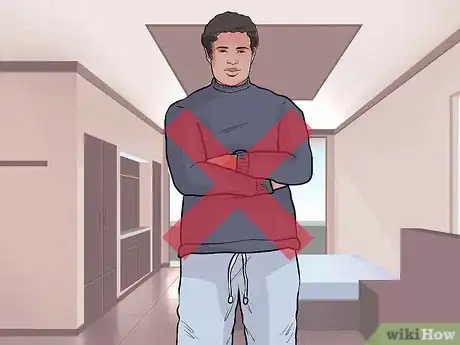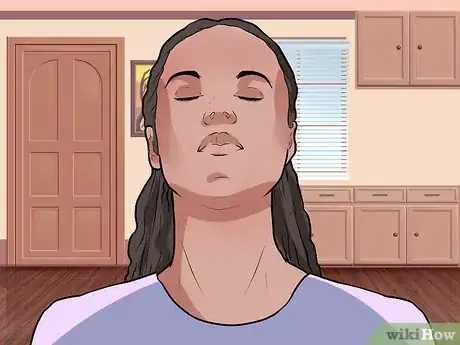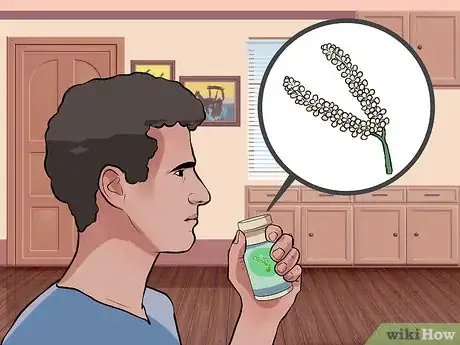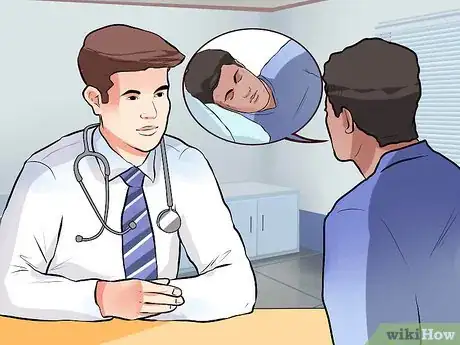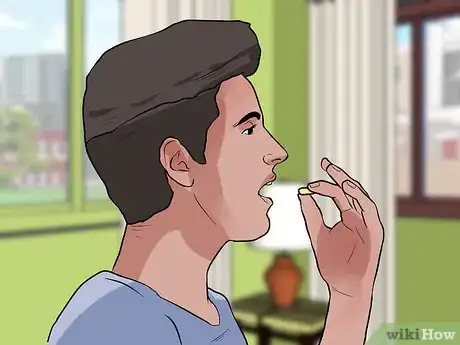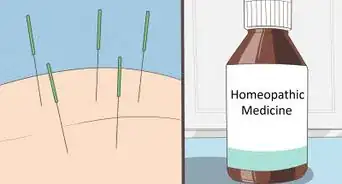This article was co-authored by Carrie Noriega, MD. Dr. Noriega is a Board Certified Obstetrician & Gynecologist and medical writer in Colorado. She specializes in women’s health, rheumatology, pulmonology, infectious disease, and gastroenterology. She received her MD from the Creighton School of Medicine in Omaha, Nebraska and completed her residency at the University of Missouri - Kansas City in 2005.
There are 11 references cited in this article, which can be found at the bottom of the page.
This article has been viewed 27,988 times.
Many people experience night sweats, which are episodes of nighttime sweating that soak pajamas or even bedding. Night sweats have many causes, including too high temperature in your bedroom or an underlying condition such as menopause.[1] By effectively using a bed fan and cooling yourself down, you may be able to relieve night sweats.
Steps
Positioning and Deploying Your Fan
-
1Learn the basics of cooling a room. Heat rises and, as a result, the coolest air hovers around the floor. Pushing up this cooler air can cool you down and minimize or prevent night sweats.[2]
- A room in which air cannot circulate properly can also get hot. A small space obstructed with large objects may not be as a cool as a larger space or one that contains less clutter.
-
2Place the fan on the floor. It seems counterintuitive that if you want to cool yourself, that you should place a fan on the floor; however, this can push up cool air so that it cools you more effectively.[3]
- Set the fan in a place where no large objects can obstruct it circulating cool air.
Advertisement -
3Position the fan towards the opposite wall. Put the fan in a position on the floor in which it points in the direction of the opposite wall. This allows cool air to bounces off the wall and circulate throughout your room.[4]
- Consider positioning the fan so that it crosses your bed when blowing toward the opposite wall. This may give you some added cooling.
- If you find that the air isn't circulating properly, remove any large objects that may be obstructing the fan. You can also put the fan on a small step or box on the floor so that it can blow more effectively to the opposite wall and around the room.
-
4Speed up cooling. Set a bowl of ice water so that the fan blows across it. This may cool down the air even faster and give you relief from your night sweats.[5]
- Don't just use a bowl of ice. Water with ice cubes or chips in it is more effective at cooling than simply ice.
- Make sure to keep the bowl of ice water away from any cords so that you don't electrocute yourself or another person.
-
5Double up your efforts. If you're very hot and feel like the fan isn't cooling you down quickly enough, double up on your cooling efforts. From air conditioning to another fan, this may cool you down even more.
- Put a small clip-on fan on your nightstand and direct it at your head. This may help get cool air to you more quickly.
- Turn on the air conditioning if you have it. This can cool down a room much more quickly, especially if you use a fan to bolster the effort.
- Set a second fan opposite from the first to create a cross-breeze.
- Open a window and allow the fan to blow from the floor across the window's path to the opposite wall.
Keeping Yourself Cool
-
1Create a comfortable sleeping environment. Make sure that your bedroom is comfortable, cool, and well ventilated. Controlling factors such as the temperature, your bedding, and air circulation may minimize how severe your night sweats are.
- Your bedroom should be between 60 to 75°F (15.6 to 23.9°C) for the best sleep.[6]
- Open a window if it is not too cold.[7]
- Make sure that your bedding isn't too tight, which can keep air from circulating around you. In addition, aim to use natural fabrics such as cotton, which breathe and can keep you cooler.
- Use a blanket that is heavy enough to keep you comfortable without overheating you. For example, you wouldn't want to use a heavy down comforter in the summer. Instead, opt for a lighter summer down or basic cotton quilt.
- Consider foregoing a flat sheet, which can add further heat.
-
2Wear loose and smooth pajamas. Tight pajamas can hold in heat and make you warmer. Wearing loose, smooth-textured, and light clothing may keep you cool and wick away sweat.
- Smooth clothing made of cotton or merino wool can minimize or prevent excess sweating. You may also want to get pajamas made specifically to keep you cool and wick away sweat.
-
3Avoid overdressing. Stay away from the temptation to wear too much to bed. Put on pajamas that are appropriate to the weather, which may minimize sweating and overheating.[8]
- Wear soft and lightweight clothing during the summer. For example, cotton is an option that lets your skin breathe.
- Layer your pajamas during the winter. This allows more easy removal of clothing items to help you cool down.
-
4Breathe deeply. There is some clinical evidence that deep breathing can help reduce night sweats. Using deep breathing exercises before bed may reduce your temperature and relieve your night sweats.[9]
- Deep breathing helps distribute oxygen throughout your body, which can relax you and may also help relieve the night sweats.
- Inhale and exhale completely through your nose. Inhale to a count of four, hold your breath for two counts, and then exhale completely to another count of four. Vary the counts of your inhalations and exhalations according to your abilities.
- To optimize your deep breathing exercises, sit upright and breathe slowly and evenly. Place a hand on your belly and feel it rise as you inhale and lower as you exhale. You want to breathe so that your stomach rises and falls, not your chest.
-
5Consider herbal remedies. There is some evidence that natural remedies such as black cohosh, dang gui bu xue tang, evening primrose oil, St. Johns wort, soy, flax, and many others can help relieve night sweats in the short-term. Speak with your doctor and take herbal remedies if other treatments aren't helping you.
- Be aware that herbal supplements and remedies are not regulated by governmental authorities and could be dangerous.
- You can get black cohosh and dang bu xue tang at many health food stores and some Chinese medical practitioners.
-
6Exercise regularly. A recent study found that regular physical activity can reduce the number and severity of night sweat episodes. Getting some type of exercise most days may help you manage your night sweats.[10]
- Incorporate 30 minutes of activity into your schedule at least five days a week. You can walk, run, jog, swim, or do any other exercise you enjoy.
- Exercise at least three hours before you go to bed to help your temperature return to normal.[11]
-
7See your doctor. If your night sweats are very severe or don't go away with basic cooling attempts, schedule an appointment with your doctor. They can assess if you have any underlying conditions or are taking medication that can cause night sweats.[12]
- Be open and honest with your doctor. Let them know when the night sweats started and what makes them better or worse.
- It's especially important to see your doctor if your night sweats are accompanied by fever or other symptoms such as unexplained weight loss, as this may be a sign of a more serious problem.[13]
- Some conditions that cause night sweats are: menopause or perimenopause, infections such as tuberculosis and abscesses, cancer, hypoglycemia, hormone disorders including hyperthyroidism, and neurologic conditions like neuropathy.
- Some medications that can cause night sweats are: antidepressants, hormone therapy, and hypoglycemic agents.[14]
-
8Treat underlying conditions. If your doctor diagnoses an underlying cause for your night sweats, get treatment for it. This may help control or eliminate your night sweats.[15]
- If you are taking medications that cause night sweats, speak to your doctor about alternative prescriptions that may continue to treat your condition as well as helping manage your night sweats.
Warnings
- Do not stop taking any medications that may cause night sweats without discussing it with your doctor.⧼thumbs_response⧽
References
- ↑ https://www.webmd.com/menopause/guide/8-causes-of-night-sweats
- ↑ http://www.apartmenttherapy.com/the-best-way-to-use-a-fan-119962
- ↑ http://www.apartmenttherapy.com/the-best-way-to-use-a-fan-119962
- ↑ http://www.apartmenttherapy.com/the-best-way-to-use-a-fan-119962
- ↑ http://www.apartmenttherapy.com/the-best-way-to-use-a-fan-119962
- ↑ http://healthysleep.med.harvard.edu/healthy/getting/overcoming/tips
- ↑ http://www.mayoclinic.org/diseases-conditions/heat-rash/basics/prevention/con-20033908
- ↑ https://patient.info/doctor/fever-and-night-sweats-pro#nav-1
- ↑ https://my.clevelandclinic.org/health/symptoms/16562-night-sweats-and-womens-health/care-and-treatment
- ↑ https://my.clevelandclinic.org/health/symptoms/16562-night-sweats-and-womens-health/care-and-treatment
- ↑ http://healthysleep.med.harvard.edu/healthy/getting/overcoming/tips
- ↑ https://health.clevelandclinic.org/night-sweats-how-you-can-find-relief/
- ↑ http://www.mayoclinic.org/symptoms/night-sweats/basics/when-to-see-doctor/sym-20050768
- ↑ http://www.mayoclinic.org/symptoms/night-sweats/basics/causes/sym-20050768
- ↑ https://health.clevelandclinic.org/night-sweats-how-you-can-find-relief/
